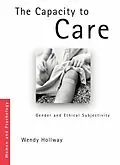What is the capacity to care and why does it matter? We are not born with the innate capability to care for others, so how do we develop it?
In this book, Wendy Hollway problematizes the assumption that the capacity to care is natural and can be taken for granted. Key processes in the early development of babies and young children, and how they create the capability for individuals to care, are explored with a focus on the role of intersubjective experience and parent-child relations. Throughout the gendered nature of care is critically examined. This includes the controversial belief that women are better at caring than men and whether this likely to change with contemporary shifts in parenting and gender relations. Similarly, the sensitive domain of the quality of care and how to assess whether care has broken down are also debated, alongside a consideration of what constitutes a good enough family.
"The Capacity to Care" provides a unique theorization of the nature of selfhood, drawing on developmental and object relations psychoanalysis, philosophical and feminist literatures. It will be of interest to social scientist studying gender development, gender relations and the family as well as for those interested in the ethics of care debate.
Autorentext
Wendy Hollway is a Professor in Psychology at the Open University. She has worked in several social science disciplines and has pursued a critical psychology perspective in many areas. She is especially interested in the development of subjectivity and the use of psychoanalysis in qualitative methodology.
Zusammenfassung
Wendy Hollway explores a subject that is largely absent from the topical literature on care. Humans are not born with a capacity to care, and this volume explores how this capacity is achieved through the experiences of primary care, gender development and later, parenting.In this book, the author addresses the assumption that the capacity to care is innate. She argues that key processes in the early development of babies and young children create the capability for individuals to care, with a focus on the role of intersubjective experience and parent-child relations. The Capacity to Care also explores the controversial belief that women are better at caring than men and questions whether this is likely to change with contemporary shifts in parenting and gender relations. Similarly, the sensitive domain of the quality of care and how to consider whether care has broken down are also debated, alongside a consideration of what constitutes a 'good enough' family.The Capacity to Care provides a unique theorization of the nature of selfhood, drawing on developmental and object relations psychoanalysis, as well as philosophical and feminist literatures. It will be of relevance to social scientists studying gender development, gender relations and the family as well as those interested in the ethics of care debate.
Inhalt
1. Introducing the Capacity to Care 2. Care, Ethics and Relational Subjectivity 3. Intersubjectivity In Self Development 4. Maternal Subjectivity and The Capacity to Care 5. The Gender of Parenting, The Gender of Care 6. Difference, Ethics and The Capacity To Care 7. Conclusions. Self, Morality and Acquiring the Capacity to Care
